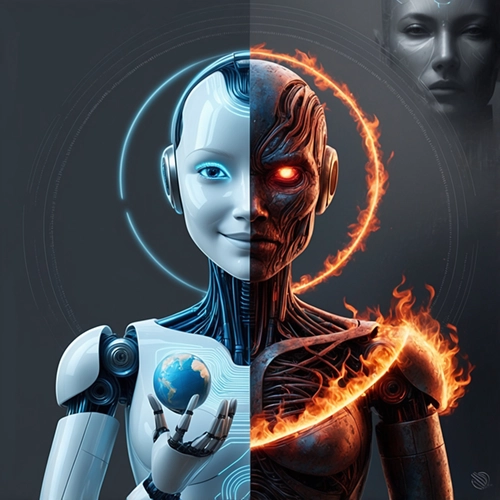Artificial Intelligence (AI) has revolutionized industries, transformed business operations, and reshaped our daily lives. As we stand on the brink of even more incredible advancements, evaluating the benefits and pitfalls of this powerful technology is inspiring. One insightful piece, “AI Lackers and Slackers,” from C-Suite Network, offers a valuable starting point for this discussion. Let’s delve into the current state of AI, the ethical implications, and the projected timeline for AI to fully embrace creativity.
The Right: Unleashing Potential
AI’s potential to revolutionize industries is not just a possibility but a promising reality that we can look forward to. From healthcare to finance, AI-driven technologies have optimized processes, reduced human error, and delivered unprecedented insights. This promising future is where AI shines, offering a beacon of hope for the industries it touches.
- Healthcare: AI algorithms assist in early diagnosis, personalized treatment plans, and even robotic surgeries, improving patient outcomes and saving lives.
- Finance: AI enhances fraud detection, risk management, and customer service, making financial systems more robust and user-friendly.
- Customer Service: AI-powered chatbots and virtual assistants provide 24/7 support, improving customer satisfaction and reducing operational costs. This reassurance of improved customer service is a testament to the positive impact of AI on businesses and individuals alike.
The Wrong: Ethical and Practical Concerns
AI’s rapid development raises several ethical and practical issues despite its advantages. These concerns must be addressed urgently to ensure AI serves humanity positively. The urgency of this task cannot be overstated.
- Bias and Discrimination: AI systems can perpetuate existing biases present in training data, leading to discriminatory outcomes in areas like hiring and law enforcement.
- Privacy: AI’s ability to analyze vast amounts of data can infringe on individual privacy, leading to surveillance and data misuse concerns.
- Job Displacement: As AI automates routine tasks, there’s a growing fear of job losses across various sectors. However, it’s important to note that AI also creates new job opportunities, particularly in data science, machine learning, and AI development. This necessitates a discussion on workforce reskilling and adaptation, where individuals can learn new skills to remain relevant in the AI-driven economy.
The Creative Leap: AI and Creativity
One of the most anticipated advancements in AI is its potential to encompass creativity. Experts predict AI will significantly progress in creative fields such as art, music, and literature within the next decade. For instance, OpenAI’s GPT-4 and its successors demonstrate AI’s burgeoning ability to generate human-like text, compose music, and even create visual art.
This could lead to a renaissance in the creative industries, with AI assisting and collaborating with human creators to produce innovative and original content. The idea is not that AI will replace human creativity but enhance and augment it, opening up new possibilities for artistic expression and innovation.
According to a Forbes article on AI creativity, companies like Google and Adobe invest heavily in AI-driven creative tools, anticipating AI will soon collaborate with humans to produce innovative and original content. This collaborative approach, which combines human intuition with AI’s analytical prowess, could redefine creativity. Rather than replacing human creativity, AI is poised to enhance and augment it, opening up new possibilities for artistic expression and innovation.
Navigating the Ethical Landscape
As we advance toward a future where AI plays a pivotal role in creativity and other domains, it’s reassuring to know that we are working to establish ethical guidelines. According to a Harvard Business Review article on AI ethics, transparency, accountability, and fairness must be at the forefront of AI development. Companies and policymakers must work together to create regulations protecting individuals while fostering innovation.
Final Thoughts
Remarkable achievements and significant challenges mark AI’s journey. By understanding what’s right and wrong with AI, we can responsibly navigate its complexities and harness its potential. As we move toward a future where AI encompasses creativity, the ethical considerations we address today will not just shape but guide the impact of AI on society for generations to come.







